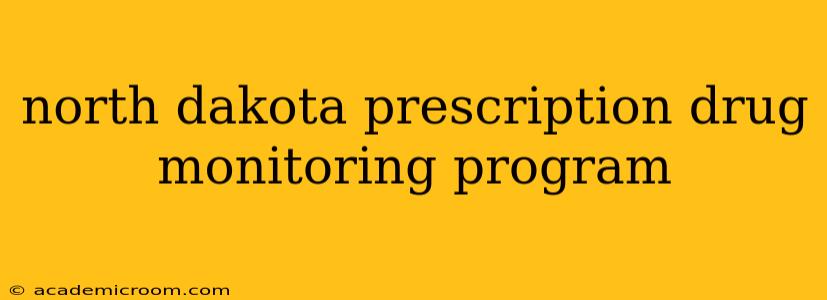North Dakota's Prescription Drug Monitoring Program (ND PDMP), officially known as the North Dakota Controlled Substances Reporting System (ND CRS), is a crucial tool in the fight against prescription drug abuse and opioid addiction. This program collects data on controlled substances dispensed within the state, providing healthcare professionals with critical information to make informed prescribing decisions and helping to identify potential cases of prescription drug misuse or diversion.
What is the North Dakota PDMP?
The ND PDMP is a centralized database that tracks the dispensing of controlled substances, including opioids, stimulants, and depressants. Pharmacies are required to report all dispensed controlled substances to the system, allowing authorized users to access this information to assess a patient's prescription history. This helps prevent patients from "doctor shopping" (obtaining prescriptions from multiple doctors) and ensures that healthcare providers are aware of potential risks associated with prescribing certain medications.
Who Can Access the North Dakota PDMP?
Access to the ND PDMP is restricted to authorized users, including:
- Healthcare professionals: Physicians, dentists, nurse practitioners, physician assistants, and other licensed healthcare providers who are registered with the program.
- Law enforcement: Law enforcement agencies can access the PDMP under specific circumstances and with appropriate authorization.
- Researchers: Researchers may gain access for approved studies focused on improving public health and combating substance abuse.
Note: Access is granted based on specific criteria and requires registration and adherence to strict confidentiality regulations. Unauthorized access is a serious offense.
How Does the North Dakota PDMP Help Combat Opioid Addiction?
The ND PDMP plays a vital role in reducing opioid-related harm by:
- Identifying patients at risk: Healthcare providers can use the PDMP to identify patients who may be at risk of opioid misuse or addiction, allowing for early intervention and appropriate treatment.
- Preventing doctor shopping: By providing a comprehensive view of a patient's prescription history, the PDMP helps prevent patients from obtaining multiple prescriptions for controlled substances from different providers.
- Monitoring prescribing practices: The data collected by the PDMP can be used to analyze prescribing patterns and identify potential areas for improvement in prescribing practices. This can lead to more responsible prescribing and a reduction in opioid overprescribing.
- Supporting law enforcement investigations: The PDMP can provide valuable information to law enforcement agencies investigating cases of prescription drug diversion or illegal distribution.
What Information is Included in the North Dakota PDMP?
The ND PDMP database contains information on dispensed controlled substances, including:
- Patient information: Name, date of birth, address.
- Prescriber information: Name, license number, practice address.
- Dispensing information: Date of dispensing, drug name, dosage, quantity.
- Pharmacy information: Name, address.
All information is kept confidential and protected by strict privacy regulations.
How Do I Access the North Dakota PDMP?
To access the ND PDMP, healthcare professionals must register and undergo training. Details on registration and training can be found on the North Dakota Department of Health website. It's essential to follow the proper procedures to ensure compliance with all regulations and maintain the confidentiality of patient information.
What are the Benefits of Using the North Dakota PDMP?
Utilizing the ND PDMP offers several key advantages:
- Improved patient safety: Helps identify and prevent potential prescription drug abuse and overdose.
- Enhanced prescribing practices: Allows healthcare providers to make more informed prescribing decisions.
- Reduced healthcare costs: Can help prevent the costs associated with treating addiction and overdose.
- Strengthened public health: Contributes to a broader effort to combat the opioid crisis.
The North Dakota PDMP is a valuable resource for healthcare professionals and law enforcement agencies working to address the opioid crisis. By providing access to comprehensive prescription drug data, the program helps to ensure patient safety, improve prescribing practices, and reduce prescription drug abuse. Remember to consult the official North Dakota Department of Health website for the most current and accurate information.
